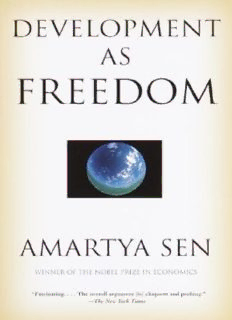Table Of ContentAcclaim for AMARTYA SEN and
DEVELOPMENT AS FREEDOM
“Indispensable.… Informed, insightful, compassionate and optimistic.”
—The Nation
“Remarkable.… The overall argument—that freedom is the principal
goal and purpose of development—gets full elaboration here.… This is a
book that rewards a reader’s effort, not least for the calm, practical
wisdom Mr. Sen brings to difficult subjects.… Eloquent and probing.”
—The New York Times
“[Sen] proposes a theory of global economic development that is
powerful, grand, and eloquently simple at the same time.… An
exhilarating work by one of the great masters of the social sciences.”
—The Boston Book Review
“Development as Freedom turns decades of economics on its head.…
Readable and enjoyable by a wide audience.… Development as Freedom is
a classic in its own time.”
—The Toronto Globe and Mail
“It is hard to disagree with Sen.… Together [his arguments] constitute a
useful corrective to the conventional wisdom, and should feature
increasingly in current debate.”
—Financial Times
“Unlike most Nobel Prize-winning economists, Sen has focused on the
well-being of those at the bottom of society, not the efficiency of those at
the top.”
—Chicago Tribune
“Amartya Sen harks back to the older and richer tradition of evaluating
the considerations of economic efficiency—which dominate most
modern economic analyses—with respect to their general social
consequences.… His thesis has radical implications.”
—Foreign Affairs
“[Development as Freedom] exudes a refreshing reasonableness and a
willingness to acknowledge rival points of view.”
—The Atlantic Monthly
AMARTYA SEN
DEVELOPMENT AS FREEDOM
Amartya Sen is the Master of Trinity College, Cambridge, and the winner
of the 1998 Nobel Prize in Economic Science.
Also by AMARTYA SEN
Collective Choice and Social Welfare
On Economic Inequality
Employment, Technology and Development
Poverty and Famines:
An Essay on Entitlement and Deprivation
Choice, Welfare and Management
Resources, Values and Development
Commodities and Capabilities
The Standard of Living
On Ethics and Economics
Hunger and Public Action (with Jean Drèze)
Inequality Reexamined
India: Economic Development
and Social Opportunity (with Jean Drèze)
FIRST ANCHOR BOOKS EDITION, AUGUST 2000
Copyright © 1999 by Amartya Sen
All rights reserved under International and Pan-American Copyright Conventions. Published in
the United States by Anchor Books, a division of Random House, Inc., New York, and
simultaneously in Canada by Random House of Canada Limited, Toronto. Originally published in
hardcover in the United States by Alfred A. Knopf, a division of Random House, Inc., New York,
in 1999.
Anchor Books and colophon are registered trademarks of Random House, Inc.
Grateful acknowledgment is made to The New York Times for permission to reprint an excerpt
from “Birth Control in China” by P. Tyler (The New York Times, June 25, 1995), copyright ©
1995 by the New York Times Co. Reprinted by permission.
Grateful acknowledgment is made to reprint previously published material: Bank of Italy: Excerpt
from “Inflation, Growth and Monetary Control: Non-linear Lessons from Crisis and Recovery” by
Michael Bruno, Paolo Baffi Lecture (Rome: 1996).
The Library of Congress has cataloged the Knopf edition as follows:
Sen, Amartya Kumar.
Development as freedom / Amartya Sen. – 1st ed.
p. cm.
I. Economic development. 2. Liberty. I. Title.
HD75.S455 1999
330′.01—dc21 99-31061
eISBN: 978-0-30787429-0
Author photograph by Kris Snibbe
Graphs by Mark Stein
www.anchorbooks.com
v3.1
To Emma
CONTENTS
Cover
About the Author
Other Books by This Author
List of Illustrations
Title Page
Copyright
Dedication
Preface
Acknowledgments
Introduction: Development as Freedom
1 The Perspective of Freedom
2 The Ends and the Means of Development
3 Freedom and the Foundations of Justice
4 Poverty as Capability Deprivation
5 Markets, State and Social Opportunity
6 The Importance of Democracy
7 Famines and Other Crises
8 Women’s Agency and Social Change
9 Population, Food and Freedom
10 Culture and Human Rights
11 Social Choice and Individual Behavior
12 Individual Freedom as a Social Commitment
Notes
ILLUSTRATIONS
1.1 Variations in Male Survival Rates by Region 1.2 Variations in
FIGURE
Female Survival Rates by Region
2.1 GNP per Capita (U.S. Dollars) and Life Expectancy at Birth,
1994
2.2 Improvements in Life Expectancy in England and Wales, 1901–
1960
2.3 Growth of GDP (U.K.) and Decadal Increases in Life Expectancy
at Birth (England and Wales), 1901–1960
4.1 Mortality Rate Ratios of Blacks to Whites (Aged 35–54), Actual
and Adjusted for Family Income 4.2 Female-Male Ratios in
Total Population in Selected Communities 7.1 Food Grains
Availability in Bangladesh, 1971–1975
9.1 Food Prices in Constant 1990 U.S. Dollars
4.1 India and Sub-Saharan Africa: Selected Comparisons (1991) 9.1
TABLE
Indices of Food Production per Head by Regions
9.2 Food Prices in Constant 1990 U.S. Dollars: 1950–1952 to 1995–
1997
Description:By the winner of the 1988 Nobel Prize in Economics, an essential and paradigm-altering framework for understanding economic development--for both rich and poor--in the twenty-first century. Freedom, Sen argues, is both the end and most efficient means of sustaining economic life and the key to

